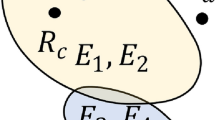Abstract
Rough set is a data evaluation methodology to take care of uncertainty in data. Attribute reduction with rough set goals to achieve a compact and informative attribute set for a given data sets, and incremental mechanism is reasonable selection for attribute reduction in dynamic data sets. This paper focuses on introducing incremental mechanism to develop effective incremental algorithm during the arrival of new attributes in terms of approach of discerning samples. The traditional definition of discernibility matrix is improved first to address fewer samples to be discerned. Based on this improvement, discernible relation is developed for every attribute and utilized to characterize attribute reduction. For dynamic data sets with the dynamically increasing of attributes, an incremental mechanism is introduced to judge and ignore unnecessary new arriving attributes. For necessary new arriving attributes, the original reduct is updated in terms of updating of discernible relations instead of information granular or information entropy. The efficiency and effectiveness of developed incremental algorithm based on this mechanism is demonstrated through experimental comparisons in this paper in terms of running time.

Similar content being viewed by others
References
Benitez-Caballero MJ, Medina J, Ramirez-Poussa E, Slȩzak D (2018) Bireducts with tolerance relations. Inf Sci 435:26–39
Benitez-Caballero MJ, Medina J, Ramirez-Poussa E, Slezak D (2019) A computational procedure for variable selection preserving different initial conditions. Int J Comput Math. https://doi.org/10.1080/00207160.2019.1613530
Bien Z (2007) Incremental inductive learning algorithm in the framework of rough set theory and its application. Int J Fuzzy Syst 1(1):25–36
Chen D, Yang Y (2014) Attribute reduction for heterogeneous data based on the combination of classical and fuzzy rough set models. IEEE Trans Fuzzy Syst 22(5):1325–1334
Chen D, Zhao S, Zhang L, Yang Y, Zhang X (2012) Sample pair selection for attribute reduction with rough set. IEEE Trans Knowl Data Eng 24(11):2080–2093
Feng H, Jin D, Guo Y (2007) Incremental algorithms for attribute reduction in decision table. Control Decis 22(3):267–268
Guan L, Wang G (2010) An incremental updating algorithm for attribute reduction set of decision tables. J Front Comput Sci Technol 4(5):436–444
Han Y, Shi P, Chen S (2015) Bipolar-valued rough fuzzy set and its applications to decision information system. IEEE Trans Fuzzy Syst 23:2358–2370
Hu Q, Yu D, Liu J, Wu C (2008) Neighborhood rough set based heterogeneous feature subset selection. Inf Sci 178(18):3577–3594
Jing Y, Li T, Huang J, Zhang Y (2016) An incremental attribute reduction approach based on knowledge granularity under the attribute generalization. Int J Approx Reason 76:80–95
Liang J, Wang F, Dang C, Qian Y (2014) A group incremental approach to feature selection applying rough set technique. IEEE Trans Knowl Data Eng 26(2):294–308
Medina J (2012) Relating attribute reduction in formal, object-oriented and property-oriented concept lattices. Comput Math Appl 64(6):1992–2002
Orlowska M, Orlowski M (1992) Maintenance of knowledge in dynamic information systems. Intelligent decision support. Springer, Netherlands
Pawlak Z (1982) Rough sets. Int J Comput Inform Sci 11(5):341–356
Shu W, Shen H (2014) Updating attribute reduction in incomplete decision systems with the variation of attribute set. Elsevier, Amsterdam
Skowron A, Rauszer C (1992) The discernibility matrices and functions in information systems. In: Słowiński R (ed) Intelligent decision support. Theory and decision library (Series D: System theory, knowledge engineering and problem solving), vol 11. Springer, Dordrecht, pp 331–362
Stawicki S, Sleak D, Janusz A, Widz S (2017) Decision bireducts and decision reducts—a comparison. Int J Approx Reason 84:75–109
Swiniarski R, Skowron A (2003) Rough set methods in feature selection and recognition. Pattern Recogn Lett 24(6):833–849
Teng S, Liu M, Yang A, Zhang J, Nian Y, He M (2016) Efficient attribute reduction from the viewpoint of discernibility. Inf Sci 326:297–314
Wang F, Liang J, Dang C (2013a) Attribute reduction for dynamic data sets. Appl Soft Comput 13(1):676–689
Wang F, Liang J, Qian Y (2013b) Attribute reduction: a dimension incremental strategy. Knowl Based Syst 39:95–108
Yao Y, Zhao Y (2009) Discernibility matrix simplification for constructing attribute reducts. Inf Sci 179(7):867–882
Zeng A, Li T, Liu D, Zhang J, Chen H (2015) A fuzzy rough set approach for incremental feature selection on hybrid information systems. Fuzzy Sets Syst 258:39–60
Ziarko W (1993) Variable precision rough set model. J Comput Syst Sci 46(1):39–59
Acknowledgements
This work is supported by the fund of North China Electric Power University, National Key R&D Program of China and the Fundamental Research Funds for the Central Universities (2018YFC0831404, 2018YFC0830605, 2018QN050).
Author information
Authors and Affiliations
Corresponding author
Ethics declarations
Conflict of interest
All authors declare that they have no conflict of interests.
Ethical approval
This article does not contain any studies with human or animals performed by any of the authors.
Additional information
Communicated by A. Di Nola.
Publisher's Note
Springer Nature remains neutral with regard to jurisdictional claims in published maps and institutional affiliations.
Rights and permissions
About this article
Cite this article
Chen, D., Dong, L. & Mi, J. Incremental mechanism of attribute reduction based on discernible relations for dynamically increasing attribute. Soft Comput 24, 321–332 (2020). https://doi.org/10.1007/s00500-019-04511-4
Published:
Issue Date:
DOI: https://doi.org/10.1007/s00500-019-04511-4




